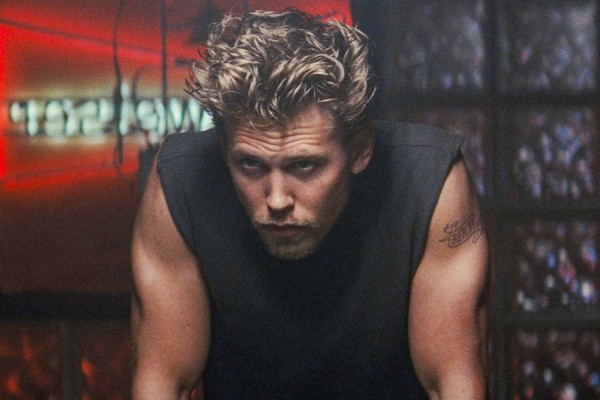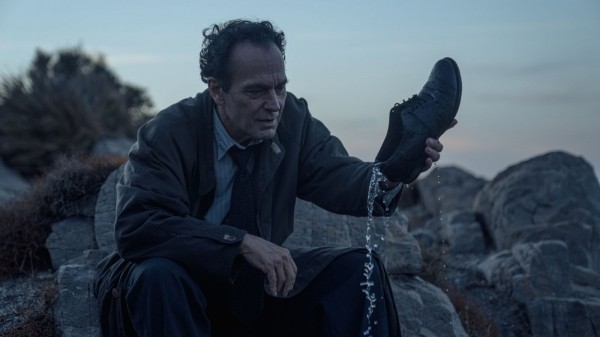1. All We Imagine as Light
Payal Kapadia, India/France/Netherlands/Luxembourg
Awash in shades of blue and drenched by monsoon rains, Payal Kapadia’s Cannes Grand Prix winner—a first for an Indian filmmaker—is a sensual immersion in the transience and yearning of urban life. Extending the lineage of Chantal Akerman and Agnès Varda, Kapadia crafts a contemporary portrait of independent South Asian women in the city, navigating work, loneliness, and desire. The three protagonists, from different generations and classes, all work at a Mumbai hospital. Their stories are fluidly told through mundane details that blossom into everyday poetry, and illuminate the strains of migration, gentrification, and Hindu-Muslim tensions, along with the conflicting pulls of tradition and modernity. As it moves from bustling street markets and commuter trains to the peaceful beaches and painted caves of Ratnagiri, All We Imagine as Light weaves a tender and expansive vision of female friendship and solidarity. —Imogen Sara Smith
2. Do Not Expect Too Much from the End of the World
Radu Jude, Romania
Radu Jude’s latest provocation, at once high-spirited and devastating in its meditation on the making of images, rides shotgun beside stressed-out gig-worker Angela (Ilinca Manolache) as she navigates chaotic Bucharest, interviewing the victims of on-the-job injuries for a promo film on worker safety. Her mission is interwoven with her raucous TikTok parodies of Andrew Tate–type misogynists, and with excerpts from a 1981 Romanian feature (another urban travelogue, this one with a woman cabdriver also named Angela). Crosscutting and cross-referencing are Jude’s organizing principles. Having juggled three distinct “movies” in the course of about two hours, he ends with a single 35-minute shot from a fixed camera, in which a chosen injured worker, partially paralyzed and in a wheelchair, is rehearsed, filmed, and refilmed until his injury is mitigated, any suggestions of hazardous working conditions are dispelled, and the blame is shifted from the employer to the victim. As a filmmaker and socialist satirist, Jude is the heir to Dušan Makavejev and more. —J. Hoberman
3. Dahomey
Mati Diop, France/Senegal/Benin
There’s something physics-defying about the films of Mati Diop—like monuments made of dust, they conjure visions redolent with history, desire, and political imaginaries out of simple, even slight narratives. Of course, that alchemy is itself something of an anti-imperial gesture, a protest against the industrial-cinematic fetish of size and capital. Take Dahomey, this year’s Berlinale Golden Bear winner. Running all of 68 minutes, it comprises just three strands: the imagined musings of a centuries-old statue—rendered both spectral and futuristic through voice distortion—being transported from France to Benin as part of a repatriation project; documentary scenes of the presidential-palace exhibit where these returned artifacts are displayed in Benin; and glimpses of a town-hall meeting in which Beninese university students debate the politics of repatriation. In the ingenious juxtaposition of three modes—nostalgia-laced fantasy, decorous spectatorship, and critical debate—Diop gets to the dialectical heart of questions of colonial return: there is no recovering the past; we can only make it and remake it in our present. —Devika Girish
4. No Other Land
Yuval Abraham, Basel Adra, Hamdan Ballal, and Rachel Szor, Palestine/Norway
Can documentaries change the world? No Other Land puts this question to the test in three different ways. The first involves the friendship between Palestinian journalist Basel Adra and his Israeli comrade, Yuval Abraham: in between harrowing scenes of Israeli soldiers demolishing the West Bank hamlet of Masafer Yatta, co-director/DP Rachel Szor films Adra, Abraham, and Hamdan Ballal (the fourth co-director) as they rebuild homes and come to an uneasy acceptance of Abraham’s allyship. The second is the challenge of making the film without Israeli state support, which the directors managed to do with their powerful merging of archival and verité footage. The third comes at the film’s close, when we see Israeli settlers escalating their violence in October 2023. How to keep making political art even when it doesn’t have any discernible effect on a deteriorating reality? Here, too, the filmmakers anticipate our despair: when Abraham is disappointed by the low readership of his articles, Adra chides him for acting like he can “solve everything in 10 days and go back home.” It requires patience, he says. “Get used to failing.” —Abby Sun
5. The Beast
Bertrand Bonello, France
Rarely has a green screen appeared more menacing than in Bertrand Bonello’s slippery, tripartite epic. The Beast begins with Léa Seydoux being directed to fend off an imaginary foe in front of a chroma-key backdrop, before shifting to the stories of three pairs of doomed lovers in three different eras, each played by Seydoux and George MacKay. There’s a lot to swallow in the French director’s take on Henry James’s 1903 novella The Beast in the Jungle, including an Elliot Rodger–quoting incel and an underwater Paris; a yearning android (Guslagie Malanda) and a gooey black bath that unearths past lives; and the tension between the illusion of infinite possibilities offered by new technologies and the sense that our lives are scripted by greater forces. An uncanny cocktail of horror, humor, and sensuality, The Beast anchors its time-skipping structure in Seydoux’s passionate persona, her perpetually tear-stained visage telegraphing the tragedy of a world in which we are condemned to passivity and endless imitation—a world in which desire must die to make living bearable. —Beatrice Loayza
6. Evil Does Not Exist
Ryûsuke Hamaguchi, Japan
The first sign of waywardness is the camera, which seems possessed of both a mysterious consciousness, as in the ethereal traveling shots that bookend the film, and an uncanny capacity to inhabit beyond-human perspectives, like that of a wild wasabi plant sprouting from the winter ground. From the start-stop interventions of Eiko Ishibashi’s sinuous music to the sly mindfuck of the title, Evil Does Not Exist is a feat of misdirection. What begins as an eco-parable, setting up a clash between the residents of a bucolic community and the urbanites behind a misbegotten glamping project, evolves into an unanswerable, darkly philosophical riddle on what it means to live on this planet. In Ryûsuke Hamaguchi’s work, the everyday realm is always charged with possibility; here, with the natural world as setting, subject, and ambiguous guiding force, the unpredictability is total and inviolable. The film’s fearsome irrationality opens onto the sublime. —Dennis Lim
7. La chimera
Alice Rohrwacher, Italy
A movie with one foot planted firmly on the ground and the other shuffling through the dreamscape of a broken heart, this rollicking, melancholy fable of Italian tomb raiders feels both deeply lived-in and out of this world. Much of La chimera’s bewitchment comes from how Alice Rohrwacher situates its narrative and emotional realm at the margins—of landscape, of making a living, of kinship networks, of memory—and allows detail and meaning to accumulate at their own pace. The overarching metaphor of lost love as lost treasure might be too on-the-nose if the movie weren’t so confident in its rhythms, so idiosyncratic in tone, and so marvelously acted. As the sad-sack expat leading a goofball band of thieves, Josh O’Connor is wholly credible and extremely filthy: here’s the second great movie this year where you can smell him through the screen. —Nathan Lee
8. Last Summer
Catherine Breillat, France
As Anne, the middle-aged mother who gives herself over to a passionate affair with her wayward teenage stepson in Catherine Breillat’s latest, actress Léa Drucker’s alert, vaguely feral physicality makes legible the unwieldy carnal appetites that drive her character. Yet a nagging question lingers throughout the film: to what extent is Anne’s lust for 17-year-old Théo (Samuel Kircher) merely the high-stakes currency in a game whose only real object is the dissipation of her boredom? As in her earlier excavations of female desire, Breillat’s muscular yet precise command of cinematic language articulates what her characters can’t or won’t say, while raising timeless questions about the nature of power and agency within the bourgeois family unit. —Madeline Whittle
9. Janet Planet
Annie Baker, U.S.
Playwright Annie Baker’s debut film is a deceptively placid period piece about the dramaturgy of family life. The Janet of the title is a single mother (Julianne Nicholson), a middle-aged acupuncturist raising a precociously depressive 11-year-old named Lacy (Zoe Ziegler). Baker patiently and lovingly depicts the push and pull of mother and daughter over the course of a summer, in 1991, as Janet and Lacy traverse comically grim romantic and platonic relationships with the granola-tinged residents of their western-Massachusetts enclave. Janet Planet is a rare thing, at once allusive in its delineations of parent-child dynamics and hilariously specific in its skewering of post-hippie boomer types (Elias Koteas’s performance as the chilled-out leader of a trippy local theater troupe is particularly on point). By the film’s baffling and poetic ending, the worldviews of mother and daughter have become artfully blended: just as Janet stage-manages her romantic life, Lacy does so with the toys in her room, her face as serious as a film director’s. —Clinton Krute
10. Anora
Sean Baker, U.S.
Sean Baker’s furiously volatile screwball comedy is a breathtaking balancing act that shifts back and forth between the hilarious and the scary, the scary and the absurd, and the romantic and the profane—and sometimes it contains all at once. Anchoring the chaos are two brilliant performances, by the extraordinary Mikey Madison as the titular stripper heroine and Mark Eydelshteyn as her irresistibly childlike client, then boyfriend, and soon husband. Baker’s deeply humane treatment of sex workers reaches a glorious apotheosis in the character of Ani, a gutsy, resourceful, but messed-up dame whose street smarts are no match for Vanya’s oligarch parents and their menacing emissaries. Amid all the mayhem, one of the hit men (Yura Borisov) sees and admires Ani in a way no one else does, least of all herself. Not yet, anyway. A Hollywood ending? Okay, but Anora is a comedy of remarriage! —Molly Haskell
Read the full lists
The Best Films of 2024





 Reply With Quote
Reply With Quote







Bookmarks